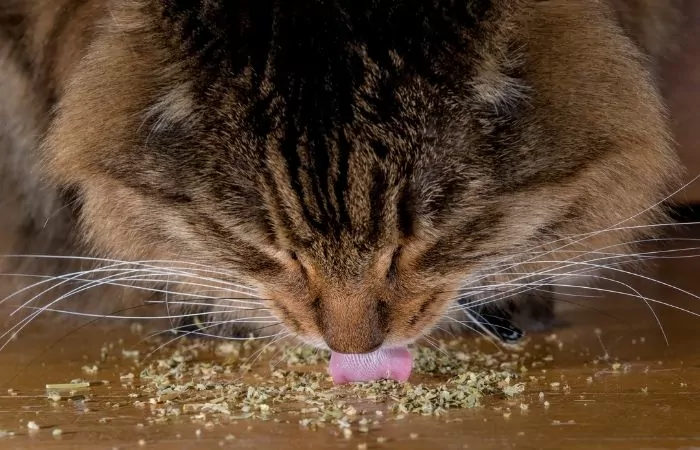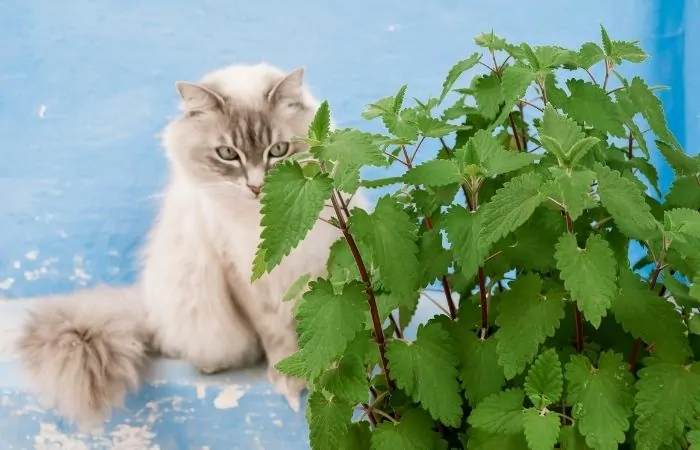What is Catnip?
You may have noticed your cat going crazy for the stuff, but what does catnip do to cats?

When smelt or ingested, catnip can cause seemingly blissful behaviors such as rolling, rubbing, and zoning out, which can be entertaining to watch. But that’s not all catnip does. It can also have health benefits for cats.
Today, we will answer all your questions about catnip, and by the end, you’ll know exactly what catnip is doing to your feline friend.
Why do Cats Like Catnip?
Catnip contains a compound (nepetalactone) that is attractive to cats. When they smell it, they are drawn closer to investigate. Some cats may just sniff it, whereas other cats will ingest the catnip.
Not all cats will respond to catnip. In fact, only about 60% of cats seem to have a behavioral reaction to it. However, it appears to be a hereditary trait, meaning if a parent cat likes catnip, their kittens will too.
Is Catnip Bad For Cats?
Catnip is not bad for cats, as long as it is given in moderation. A small amount of catnip can be positive for a cat. If you notice your cat wanting to eat it, you will need to monitor them closely to ensure they don’t ingest too much.
If you notice your cat becoming aggressive after contact with catnip, it may be best to avoid it. Cats may become aggressive to other cats or people.
Does Catnip Make Cats High?
When you glance over at your cat enjoying some catnip, they may look “high.” It is important to know that catnip is not an addictive drug; also, not every cat will respond to it. However, the euphoric behaviors that cats exhibit followed by a period of calm do mimic the effects of some drugs.
So to answer the question, if it’s true that catnip does affect dopamine levels, then it could be considered that it causes cats to become “high.”
What is Catnip Made of?
Catnip is a herb that belongs to the mint family Lamiaceae, which contains herbs such as rosemary, sage, and basil. Catnip contains volatile oils which give it its smell, a chemical in these oils called nepetalactone causes the euphoric behavior you might have noticed in your cat.
Can Cats Overdose on Catnip?
Too much catnip can lead to health issues in cats, such as vomiting, diarrhea, trouble walking, or disorientation.
Make sure only to use a small amount at a time and never force your cat to smell or ingest catnip. If you are unsure how much catnip you can give your cat, ask your veterinarian.
Fresh catnip is more potent than dried, so your cat won’t need as much to get the effects. However, it is not recommended to use catnip oils as they are highly concentrated and quickly become toxic.
Catnip Effects on Cats
When nepetalactone binds to receptors in the nose, the chemical causes stimulation to sensory neurons leading to the brain. It is hypothesized that nepetalactone causes a release of dopamine which is a neurotransmitter that causes feelings of euphoria and bliss in people.
The effects last approximately 10 minutes. Some cats will then become calm and sleep, while others will become playful and hyper. In some instances, cats may become aggressive. Once the effects of catnip have worn off, it will take at least two hours before your cat will become receptive to catnip again.
Can Kittens Have Catnip?
Catnip is not harmful to kittens. However, it takes a while before kittens are old enough to react to catnip. Until a kitten is over six months, they are unlikely to respond to catnip, and some kittens may only react in their adult life stage.
How to Use Catnip
Catnip can be purchased in many forms, including fresh catnip (as a plant), dried catnip, catnip sprays, and within cat toys.
The different forms can suit different cats. For example, if you find your cat eats it too much as it causes an upset stomach, then buying catnip in a spray may benefit them. On the other hand, you could spray the catnip on a toy or scratching post and let them go wild.
You could consider getting a plant in cats that enjoy chewing on catnip, so they always have fresh catnip available.
Catnip isn’t just for cats! It has been grown by people for centuries as it is known for its sedative effect. It is most commonly made into a calming tea, but it can work as a mosquito repellent in concentrated forms.
Benefits of Catnip for Cats
There are three main ways that catnip will be used for a cat:
Enrichment
There are many toys on the market that contain catnip. Buying one of these may encourage play in an otherwise sedentary cat. In addition, purchasing a toy with catnip in it that you can play with together can help with bonding.
Training
In cats that respond to catnip, it can be used as an effective training tool. For example, encouraging them to scratch on their post instead of your couch can be done by sprinkling some catnip on their scratching post. Likewise, if your cat is a little wary of their new bed, sprinkling some catnip in it might help them use it and feel more comfortable.
To help with anxiety
Catnip can be calming, especially if it is ingested. Offering your cat some catnip when it is anxious may help them to settle. Also, if your cat suffers from separation anxiety, offering them catnip before you leave may make the time apart a little easier.
The Catnip Plant for Cats
Catnip is a type of plant with the scientific name Nepeta cataria. It is a short-lived, perennial plant that can grow three feet high and is in the mint family. Catnip is also known as catswort, catwort, and catmint.

Catnip is native to southern and eastern Europe, the Middle East, Central Asia, and parts of China. Catnip was brought to North America during European settlement.
Smelling vs. Eating Catnip
Some cats may elect just to sniff catnip, whereas others go for a munch. Thus, it appears the effects differ on how cats receive the active ingredient. When cats smell catnip, they become more active and roll around, rubbing their face, playing, and sometimes becoming aggressive.
When a cat ingests catnip, it seems to cause them to mellow out and become calm.
How to Keep Your Catnip Fresh
Catnip does lose its potency over time, so it is best to store it in an airtight container in the freezer to maintain its effects.
As you will now know, catnip can be a lot of fun for our feline friends. Given in small quantities, most cats will exhibit blissful behaviors that can benefit play, training, and anxiety.
Make sure to check with your veterinarian about how much is appropriate to give to your cat. If you notice any adverse reactions stop giving the catnip to them and contact your veterinarian for advice.
